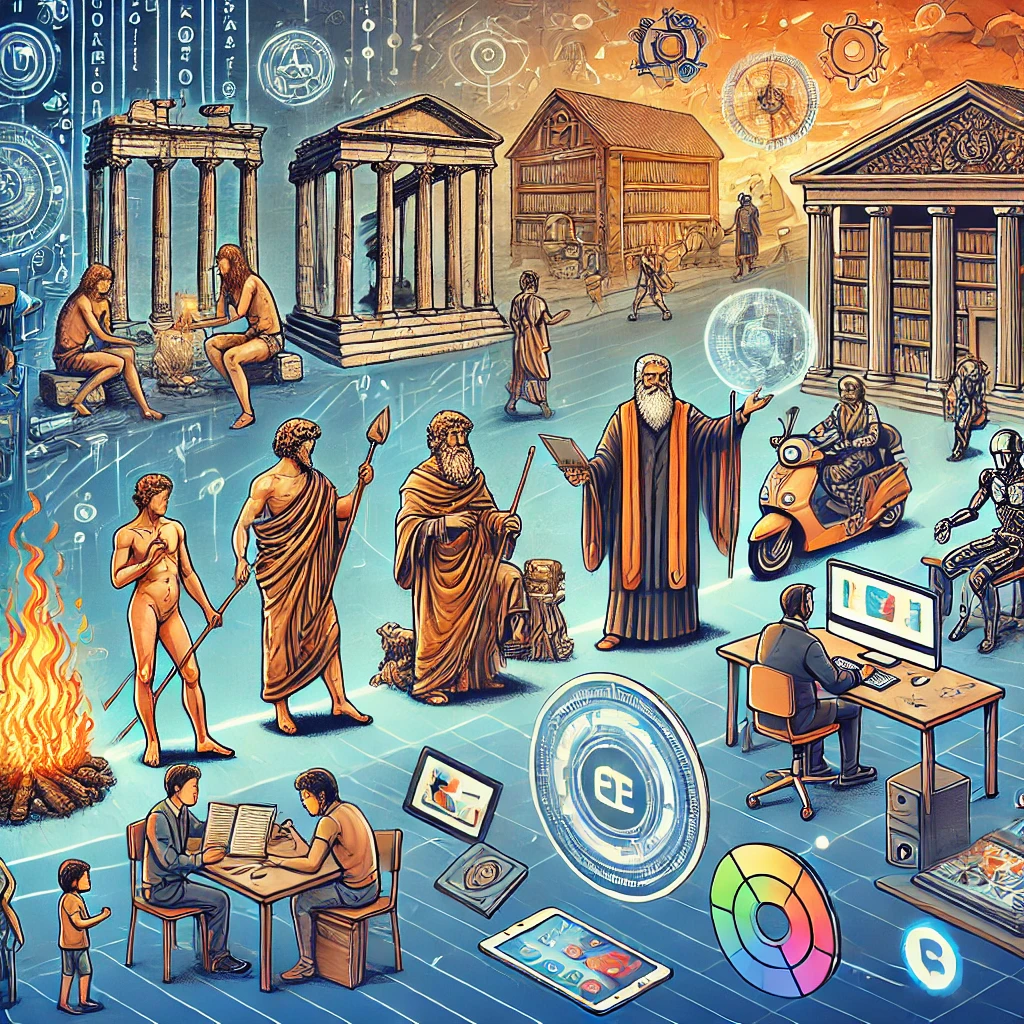Learning is an innate part of human existence, driving our evolution from primitive survival instincts to the complex educational systems of today. This journey reveals how our understanding of knowledge acquisition has transformed over millennia, shaping not only individuals but also societies. Let’s explore the fascinating evolution of learning, tracing its roots from early humans to the sophisticated frameworks of modern education.
1. Learning in Prehistoric Times: Survival as the Primary Goal
For early humans, learning was a matter of survival. It wasn’t about textbooks or classrooms but about understanding the environment, hunting, gathering, and building tools.
- Methods of Learning: Observation, imitation, and trial-and-error were the primary ways knowledge was passed down.
- Content: Skills like making fire, crafting weapons, identifying edible plants, and recognizing predators were vital.
- Social Transmission: Elders and experienced members of the group served as the first “teachers,” imparting practical knowledge through demonstration.
This phase laid the foundation for the human ability to adapt and innovate.
2. The Birth of Structured Learning: Ancient Civilizations
As societies grew more complex, so did their approach to learning. Formal education began to emerge in ancient civilizations like Mesopotamia, Egypt, Greece, and China.
- Writing and Record-Keeping: The invention of writing allowed knowledge to be recorded and preserved. Clay tablets, scrolls, and later, books, became tools for learning.
- Specialized Education: Certain individuals were trained as scribes, priests, or scholars to serve their communities.
- Philosophical Contributions: Ancient Greece introduced critical thinking and inquiry-based learning through philosophers like Socrates, Plato, and Aristotle.
Education in this era was often limited to the elite, marking the beginning of disparities in access to learning.
3. The Middle Ages: The Rise of Religious Education
During the Middle Ages, religious institutions became the primary centres of learning.
- Monastic Schools: Monasteries preserved and taught knowledge through manuscripts, focusing on religious texts and moral teachings.
- Universities: The establishment of medieval universities in Europe, such as the University of Bologna and Oxford, marked a shift toward broader intellectual pursuits.
- Curriculum: Subjects like theology, philosophy, and the trivium (grammar, rhetoric, logic) and quadrivium (arithmetic, geometry, music, astronomy) formed the basis of education.
While education expanded, it remained inaccessible to most, with a strong emphasis on religious doctrine.
4. The Renaissance and Enlightenment: Knowledge for All
The Renaissance and Enlightenment periods heralded a shift toward humanism and scientific inquiry, transforming education into a tool for exploration and creativity.
- Printing Press Revolution: The invention of the printing press by Johannes Gutenberg made books more accessible, democratizing knowledge.
- Scientific Inquiry: Thinkers like Galileo, Newton, and Descartes emphasized experimentation and observation.
- Public Education Movements: Education began to extend beyond the elite, with the establishment of public schools in some regions.
This era laid the groundwork for modern education by valuing reason, individualism, and universal access to knowledge.
5. The Industrial Revolution: Education for the Masses
The Industrial Revolution brought about significant changes in education, aligning it with the needs of industrialized societies.
- Compulsory Education: Many countries introduced mandatory schooling to create a literate and skilled workforce.
- Standardized Curriculum: Education systems became more structured, focusing on reading, writing, arithmetic, and practical skills.
- Technical and Vocational Training: Schools preparing students for specific trades and professions to meet industrial demands.
While this period improved access to education, it also prioritized conformity and efficiency, shaping the rigid structures still present in some systems today.
6. The 20th Century: The Dawn of Modern Education
The 20th century witnessed rapid advancements in education, driven by global events and technological progress.
- Universal Education: Education became a right rather than a privilege, with widespread access to schools and higher education.
- Innovative Pedagogies: Educators like Maria Montessori and John Dewey introduced child-centered and experiential learning approaches.
- Technology in Education: The use of audiovisual tools, computers, and the internet revolutionized how knowledge was delivered.
Education began to focus on critical thinking, creativity, and lifelong learning, preparing individuals for a rapidly changing world.
7. The Digital Age: Learning Without Boundaries
Today, learning is no longer confined to classrooms or physical locations. The digital age has redefined education through innovation and accessibility.
- E-Learning Platforms: Tools like Khan Academy, Coursera, and Duolingo provide free or affordable access to quality education.
- Personalized Learning: AI and data analytics enable customized learning experiences tailored to individual needs.
- Global Collaboration: Online forums, social media, and virtual classrooms connect learners and educators worldwide.
- Skill-Based Education: Microlearning and short-term courses cater to the demand for specific skills in industries like technology and business.
The digital age has made learning more inclusive, flexible, and aligned with the needs of the 21st century.
8. The Future of Learning: Where Are We Headed?
The evolution of learning continues, with exciting possibilities on the horizon:
- Immersive Technologies: Virtual reality (VR) and augmented reality (AR) are transforming hands-on learning experiences.
- Lifelong Learning: The rapid pace of change in industries emphasizes the need for continual skill development.
- Global Collaboration: Education will increasingly involve cross-cultural exchanges and interdisciplinary approaches.
- Ethical Education: As technology advances, teaching ethics, empathy, and social responsibility becomes crucial.
The future of learning is boundless, shaped by technology, diversity, and the pursuit of knowledge for all.
Conclusion: A Journey Worth Reflecting On
From the survival instincts of early humans to the interconnected world of digital education, the evolution of learning tells a story of resilience, innovation, and progress. As we continue to advance, it’s essential to reflect on how far we’ve come and strive for an education system that is inclusive, equitable, and adaptable to future challenges.
What do you think is the most significant milestone in the evolution of learning? Share your thoughts in the comments below!

